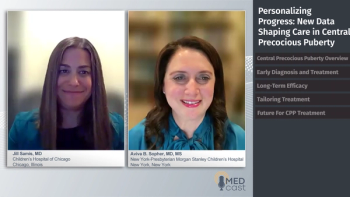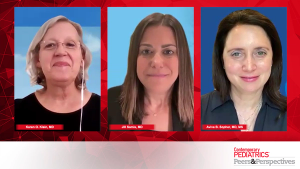Articles by Jill Samis, MD

Panelists discuss how central precocious puberty involves early activation of the hypothalamic-pituitary-gonadal axis before age 8 in girls and age 9 in boys. This requires individualized treatment decisions based on factors such as growth velocity, bone age advancement, and psychosocial impact, with GnRH agonist therapies available in multiple formulations (injections and implants) that effectively suppress puberty while preserving final height potential and have reassuring long-term safety profiles for bone health and fertility outcomes.

Panelists discuss how central precocious puberty involves early activation of the hypothalamic-pituitary-gonadal axis before age 8 in girls and age 9 in boys. This requires individualized treatment decisions based on factors such as growth velocity, bone age advancement, and psychosocial impact, with GnRH agonist therapies available in multiple formulations (injections and implants) that effectively suppress puberty while preserving final height potential and have reassuring long-term safety profiles for bone health and fertility outcomes.

The panel examines potential long-term effects of central precocious puberty treatment on bone density and spermatogenesis in male patients.

Experts offer recommendations for supporting central precocious puberty patients in managing the social stigma and challenges associated with their condition.

Experts address common misconceptions about the timing of central precocious puberty treatment initiation and discontinuation, highlighting research on outcomes for therapy started before age 7 and continued beyond age 12.

Pediatric endocrinologists explore comprehensive, individualized treatment strategies for Central Precocious Puberty that extend beyond considerations of chronological and bone age.

The panel examines the efficacy and safety profiles of gonadotropin-releasing hormone analogue (GnRHa) treatments in managing Central Precocious Puberty.

Key opinion leaders analyze current treatment guidelines for Central Precocious Puberty while offering insights on navigating treatment selection in scenarios lacking established protocols.

The panel explores the impact of early versus delayed diagnosis and treatment initiation on long-term outcomes in Central Precocious Puberty patients.

Renowned specialists in central precocious puberty examine the potential psychological and social implications of CPP on affected children.

Key opinion leaders offer insights into the pathogenesis and essential features of CPP, along with additional symptoms that clinicians should monitor.




